
A Ton of Tonics
I love gin.
I love gin and tonic.
The Spanish love gin and tonic even more than I do.
As a person raised where juniper trees grow wild, I honestly thought that wasn’t possible, but it’s true.
And here is the evidence that my love is the lesser:
I don’t really know anything about tonic. Or perhaps more correctly, I have not made a study of tonics. When I enter a bar, I don’t have a favored tonic that I want combined with my favored gin. I don’t have a specific gin and specific tonic I drink when lounging on the terraza with friends on a Saturday afternoon. I don’t have a different specific gin and specific tonic that I drink when urging on my favorite soccer team.

A lineup of five different tonics in Cafe La Ville in Ribadasella, Spain: Fever-Tree, Blue Tonic, Nordic Blue, Nordic, and Schweppes.
An example of how serious the Spanish love of tonic and how complex the taste spectrum is in the Spanish mind?
A café (by no means a special cocktail bar) in Oviedo had a printed menu I could study. There were no less than seven tonics available for the casual customer to chose from. I transcribe:
- Fentiman’s, “Botanically Brewed Tonic”
- Fever-Tree, “Premium Indian Tonic”
- Indi & Co, “Quinine estract natural”
- Nordic Blue (No tag line! Hire a new marketing team! Maybe it sells itself.)
- Noric Mist, “Finest World”
- Schwepps, “Original Indian Tonic Premium”
- Segram’s, “Since 1857 Tonic Water”
On prime time television, competing brands advertise tonic. There is no cola war in Spain (Coke’s won that.), but there is a fierce battle between tonics.
Tasting between media mortal shells,
Chris
Recent Comments